Employment Law and Practice: Sri Lanka, International Labour Law
VerifiedAdded on 2023/01/12
|9
|2936
|34
Report
AI Summary
This report provides a comprehensive overview of employment law, focusing on the context of Sri Lanka and its relationship with international labour standards. The report begins by defining employment law and its significance in regulating the employer-employee relationship, emphasizing the importance of legal frameworks in defining rights and duties. It then delves into a comparison between international labour laws and Sri Lankan labour laws, highlighting key conventions and standards followed by Sri Lanka, such as those from the International Labour Organisation. The report also includes a detailed case study, 'National State Service Union and Other vs. Bogawanthalawa Tea Estate PLC,' analyzing the issues, legal principles applied, and evidence presented. The case study examines issues of constructive dismissal and the employer's responsibilities in providing accommodation, as well as the application of tests to determine employment status. The report concludes by summarizing key legal concepts and their practical implications within the Sri Lankan employment context.
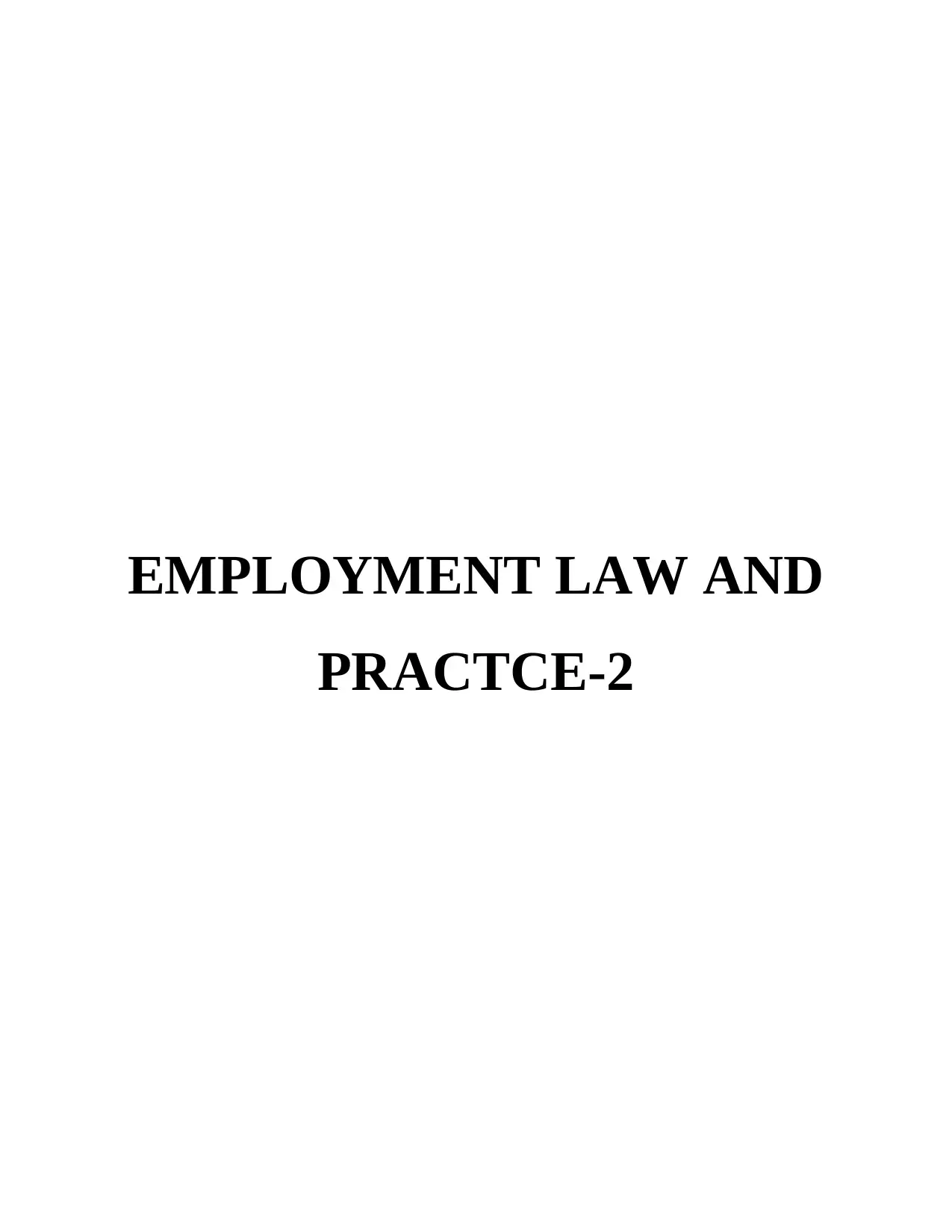
EMPLOYMENT LAW AND
PRACTCE-2
PRACTCE-2
Paraphrase This Document
Need a fresh take? Get an instant paraphrase of this document with our AI Paraphraser

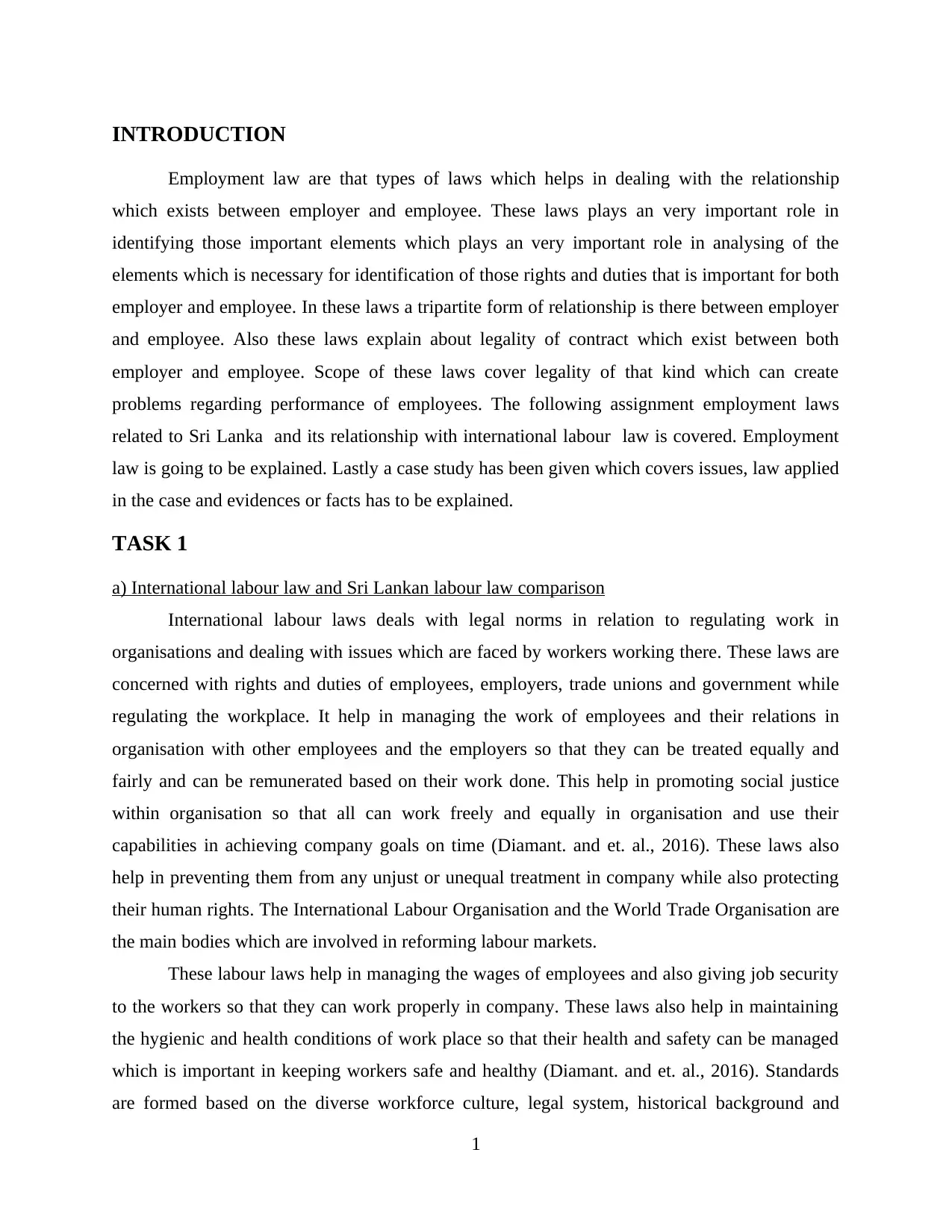
INTRODUCTION
Employment law are that types of laws which helps in dealing with the relationship
which exists between employer and employee. These laws plays an very important role in
identifying those important elements which plays an very important role in analysing of the
elements which is necessary for identification of those rights and duties that is important for both
employer and employee. In these laws a tripartite form of relationship is there between employer
and employee. Also these laws explain about legality of contract which exist between both
employer and employee. Scope of these laws cover legality of that kind which can create
problems regarding performance of employees. The following assignment employment laws
related to Sri Lanka and its relationship with international labour law is covered. Employment
law is going to be explained. Lastly a case study has been given which covers issues, law applied
in the case and evidences or facts has to be explained.
TASK 1
a) International labour law and Sri Lankan labour law comparison
International labour laws deals with legal norms in relation to regulating work in
organisations and dealing with issues which are faced by workers working there. These laws are
concerned with rights and duties of employees, employers, trade unions and government while
regulating the workplace. It help in managing the work of employees and their relations in
organisation with other employees and the employers so that they can be treated equally and
fairly and can be remunerated based on their work done. This help in promoting social justice
within organisation so that all can work freely and equally in organisation and use their
capabilities in achieving company goals on time (Diamant. and et. al., 2016). These laws also
help in preventing them from any unjust or unequal treatment in company while also protecting
their human rights. The International Labour Organisation and the World Trade Organisation are
the main bodies which are involved in reforming labour markets.
These labour laws help in managing the wages of employees and also giving job security
to the workers so that they can work properly in company. These laws also help in maintaining
the hygienic and health conditions of work place so that their health and safety can be managed
which is important in keeping workers safe and healthy (Diamant. and et. al., 2016). Standards
are formed based on the diverse workforce culture, legal system, historical background and
1
Employment law are that types of laws which helps in dealing with the relationship
which exists between employer and employee. These laws plays an very important role in
identifying those important elements which plays an very important role in analysing of the
elements which is necessary for identification of those rights and duties that is important for both
employer and employee. In these laws a tripartite form of relationship is there between employer
and employee. Also these laws explain about legality of contract which exist between both
employer and employee. Scope of these laws cover legality of that kind which can create
problems regarding performance of employees. The following assignment employment laws
related to Sri Lanka and its relationship with international labour law is covered. Employment
law is going to be explained. Lastly a case study has been given which covers issues, law applied
in the case and evidences or facts has to be explained.
TASK 1
a) International labour law and Sri Lankan labour law comparison
International labour laws deals with legal norms in relation to regulating work in
organisations and dealing with issues which are faced by workers working there. These laws are
concerned with rights and duties of employees, employers, trade unions and government while
regulating the workplace. It help in managing the work of employees and their relations in
organisation with other employees and the employers so that they can be treated equally and
fairly and can be remunerated based on their work done. This help in promoting social justice
within organisation so that all can work freely and equally in organisation and use their
capabilities in achieving company goals on time (Diamant. and et. al., 2016). These laws also
help in preventing them from any unjust or unequal treatment in company while also protecting
their human rights. The International Labour Organisation and the World Trade Organisation are
the main bodies which are involved in reforming labour markets.
These labour laws help in managing the wages of employees and also giving job security
to the workers so that they can work properly in company. These laws also help in maintaining
the hygienic and health conditions of work place so that their health and safety can be managed
which is important in keeping workers safe and healthy (Diamant. and et. al., 2016). Standards
are formed based on the diverse workforce culture, legal system, historical background and
1
⊘ This is a preview!⊘
Do you want full access?
Subscribe today to unlock all pages.

Trusted by 1+ million students worldwide
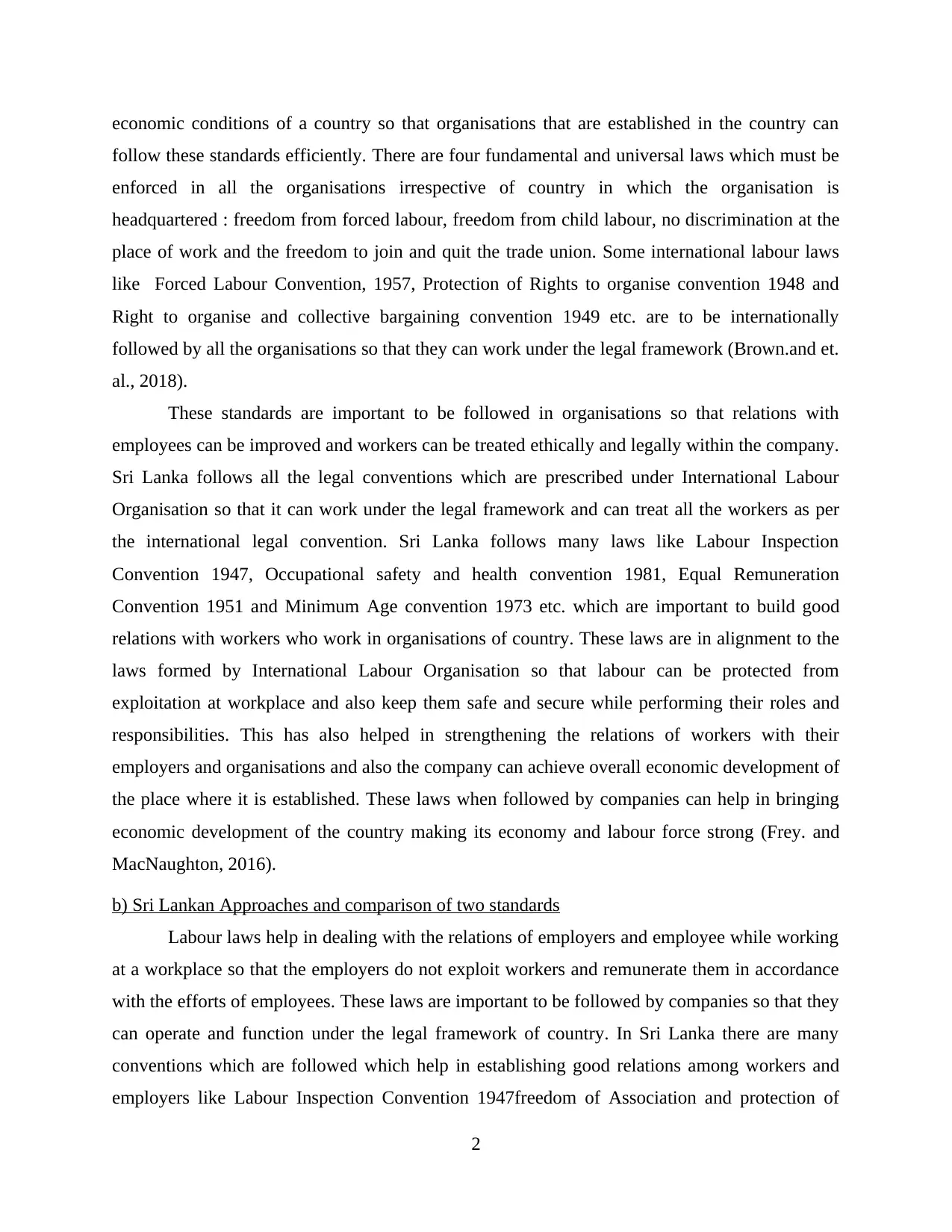
economic conditions of a country so that organisations that are established in the country can
follow these standards efficiently. There are four fundamental and universal laws which must be
enforced in all the organisations irrespective of country in which the organisation is
headquartered : freedom from forced labour, freedom from child labour, no discrimination at the
place of work and the freedom to join and quit the trade union. Some international labour laws
like Forced Labour Convention, 1957, Protection of Rights to organise convention 1948 and
Right to organise and collective bargaining convention 1949 etc. are to be internationally
followed by all the organisations so that they can work under the legal framework (Brown.and et.
al., 2018).
These standards are important to be followed in organisations so that relations with
employees can be improved and workers can be treated ethically and legally within the company.
Sri Lanka follows all the legal conventions which are prescribed under International Labour
Organisation so that it can work under the legal framework and can treat all the workers as per
the international legal convention. Sri Lanka follows many laws like Labour Inspection
Convention 1947, Occupational safety and health convention 1981, Equal Remuneration
Convention 1951 and Minimum Age convention 1973 etc. which are important to build good
relations with workers who work in organisations of country. These laws are in alignment to the
laws formed by International Labour Organisation so that labour can be protected from
exploitation at workplace and also keep them safe and secure while performing their roles and
responsibilities. This has also helped in strengthening the relations of workers with their
employers and organisations and also the company can achieve overall economic development of
the place where it is established. These laws when followed by companies can help in bringing
economic development of the country making its economy and labour force strong (Frey. and
MacNaughton, 2016).
b) Sri Lankan Approaches and comparison of two standards
Labour laws help in dealing with the relations of employers and employee while working
at a workplace so that the employers do not exploit workers and remunerate them in accordance
with the efforts of employees. These laws are important to be followed by companies so that they
can operate and function under the legal framework of country. In Sri Lanka there are many
conventions which are followed which help in establishing good relations among workers and
employers like Labour Inspection Convention 1947freedom of Association and protection of
2
follow these standards efficiently. There are four fundamental and universal laws which must be
enforced in all the organisations irrespective of country in which the organisation is
headquartered : freedom from forced labour, freedom from child labour, no discrimination at the
place of work and the freedom to join and quit the trade union. Some international labour laws
like Forced Labour Convention, 1957, Protection of Rights to organise convention 1948 and
Right to organise and collective bargaining convention 1949 etc. are to be internationally
followed by all the organisations so that they can work under the legal framework (Brown.and et.
al., 2018).
These standards are important to be followed in organisations so that relations with
employees can be improved and workers can be treated ethically and legally within the company.
Sri Lanka follows all the legal conventions which are prescribed under International Labour
Organisation so that it can work under the legal framework and can treat all the workers as per
the international legal convention. Sri Lanka follows many laws like Labour Inspection
Convention 1947, Occupational safety and health convention 1981, Equal Remuneration
Convention 1951 and Minimum Age convention 1973 etc. which are important to build good
relations with workers who work in organisations of country. These laws are in alignment to the
laws formed by International Labour Organisation so that labour can be protected from
exploitation at workplace and also keep them safe and secure while performing their roles and
responsibilities. This has also helped in strengthening the relations of workers with their
employers and organisations and also the company can achieve overall economic development of
the place where it is established. These laws when followed by companies can help in bringing
economic development of the country making its economy and labour force strong (Frey. and
MacNaughton, 2016).
b) Sri Lankan Approaches and comparison of two standards
Labour laws help in dealing with the relations of employers and employee while working
at a workplace so that the employers do not exploit workers and remunerate them in accordance
with the efforts of employees. These laws are important to be followed by companies so that they
can operate and function under the legal framework of country. In Sri Lanka there are many
conventions which are followed which help in establishing good relations among workers and
employers like Labour Inspection Convention 1947freedom of Association and protection of
2
Paraphrase This Document
Need a fresh take? Get an instant paraphrase of this document with our AI Paraphraser
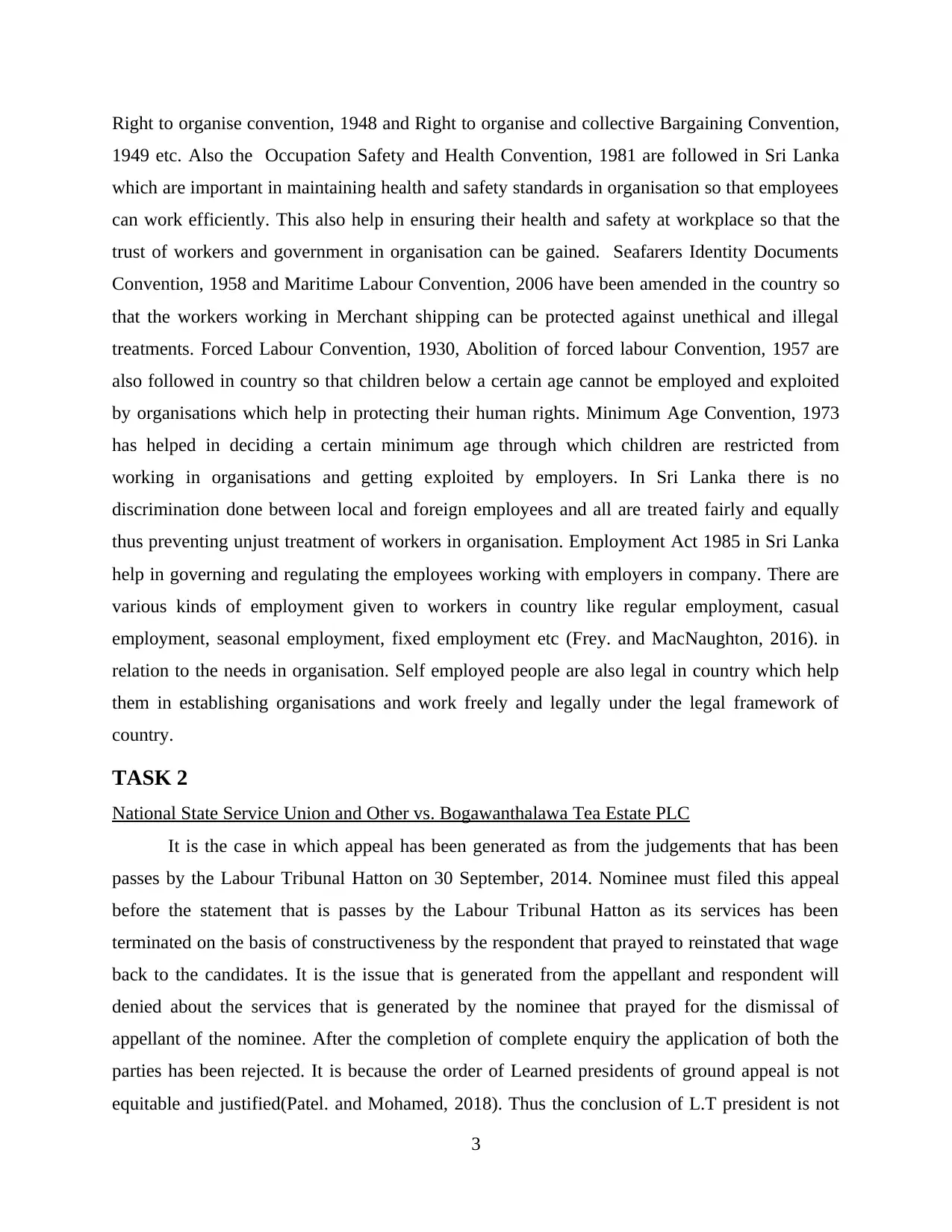
Right to organise convention, 1948 and Right to organise and collective Bargaining Convention,
1949 etc. Also the Occupation Safety and Health Convention, 1981 are followed in Sri Lanka
which are important in maintaining health and safety standards in organisation so that employees
can work efficiently. This also help in ensuring their health and safety at workplace so that the
trust of workers and government in organisation can be gained. Seafarers Identity Documents
Convention, 1958 and Maritime Labour Convention, 2006 have been amended in the country so
that the workers working in Merchant shipping can be protected against unethical and illegal
treatments. Forced Labour Convention, 1930, Abolition of forced labour Convention, 1957 are
also followed in country so that children below a certain age cannot be employed and exploited
by organisations which help in protecting their human rights. Minimum Age Convention, 1973
has helped in deciding a certain minimum age through which children are restricted from
working in organisations and getting exploited by employers. In Sri Lanka there is no
discrimination done between local and foreign employees and all are treated fairly and equally
thus preventing unjust treatment of workers in organisation. Employment Act 1985 in Sri Lanka
help in governing and regulating the employees working with employers in company. There are
various kinds of employment given to workers in country like regular employment, casual
employment, seasonal employment, fixed employment etc (Frey. and MacNaughton, 2016). in
relation to the needs in organisation. Self employed people are also legal in country which help
them in establishing organisations and work freely and legally under the legal framework of
country.
TASK 2
National State Service Union and Other vs. Bogawanthalawa Tea Estate PLC
It is the case in which appeal has been generated as from the judgements that has been
passes by the Labour Tribunal Hatton on 30 September, 2014. Nominee must filed this appeal
before the statement that is passes by the Labour Tribunal Hatton as its services has been
terminated on the basis of constructiveness by the respondent that prayed to reinstated that wage
back to the candidates. It is the issue that is generated from the appellant and respondent will
denied about the services that is generated by the nominee that prayed for the dismissal of
appellant of the nominee. After the completion of complete enquiry the application of both the
parties has been rejected. It is because the order of Learned presidents of ground appeal is not
equitable and justified(Patel. and Mohamed, 2018). Thus the conclusion of L.T president is not
3
1949 etc. Also the Occupation Safety and Health Convention, 1981 are followed in Sri Lanka
which are important in maintaining health and safety standards in organisation so that employees
can work efficiently. This also help in ensuring their health and safety at workplace so that the
trust of workers and government in organisation can be gained. Seafarers Identity Documents
Convention, 1958 and Maritime Labour Convention, 2006 have been amended in the country so
that the workers working in Merchant shipping can be protected against unethical and illegal
treatments. Forced Labour Convention, 1930, Abolition of forced labour Convention, 1957 are
also followed in country so that children below a certain age cannot be employed and exploited
by organisations which help in protecting their human rights. Minimum Age Convention, 1973
has helped in deciding a certain minimum age through which children are restricted from
working in organisations and getting exploited by employers. In Sri Lanka there is no
discrimination done between local and foreign employees and all are treated fairly and equally
thus preventing unjust treatment of workers in organisation. Employment Act 1985 in Sri Lanka
help in governing and regulating the employees working with employers in company. There are
various kinds of employment given to workers in country like regular employment, casual
employment, seasonal employment, fixed employment etc (Frey. and MacNaughton, 2016). in
relation to the needs in organisation. Self employed people are also legal in country which help
them in establishing organisations and work freely and legally under the legal framework of
country.
TASK 2
National State Service Union and Other vs. Bogawanthalawa Tea Estate PLC
It is the case in which appeal has been generated as from the judgements that has been
passes by the Labour Tribunal Hatton on 30 September, 2014. Nominee must filed this appeal
before the statement that is passes by the Labour Tribunal Hatton as its services has been
terminated on the basis of constructiveness by the respondent that prayed to reinstated that wage
back to the candidates. It is the issue that is generated from the appellant and respondent will
denied about the services that is generated by the nominee that prayed for the dismissal of
appellant of the nominee. After the completion of complete enquiry the application of both the
parties has been rejected. It is because the order of Learned presidents of ground appeal is not
equitable and justified(Patel. and Mohamed, 2018). Thus the conclusion of L.T president is not
3
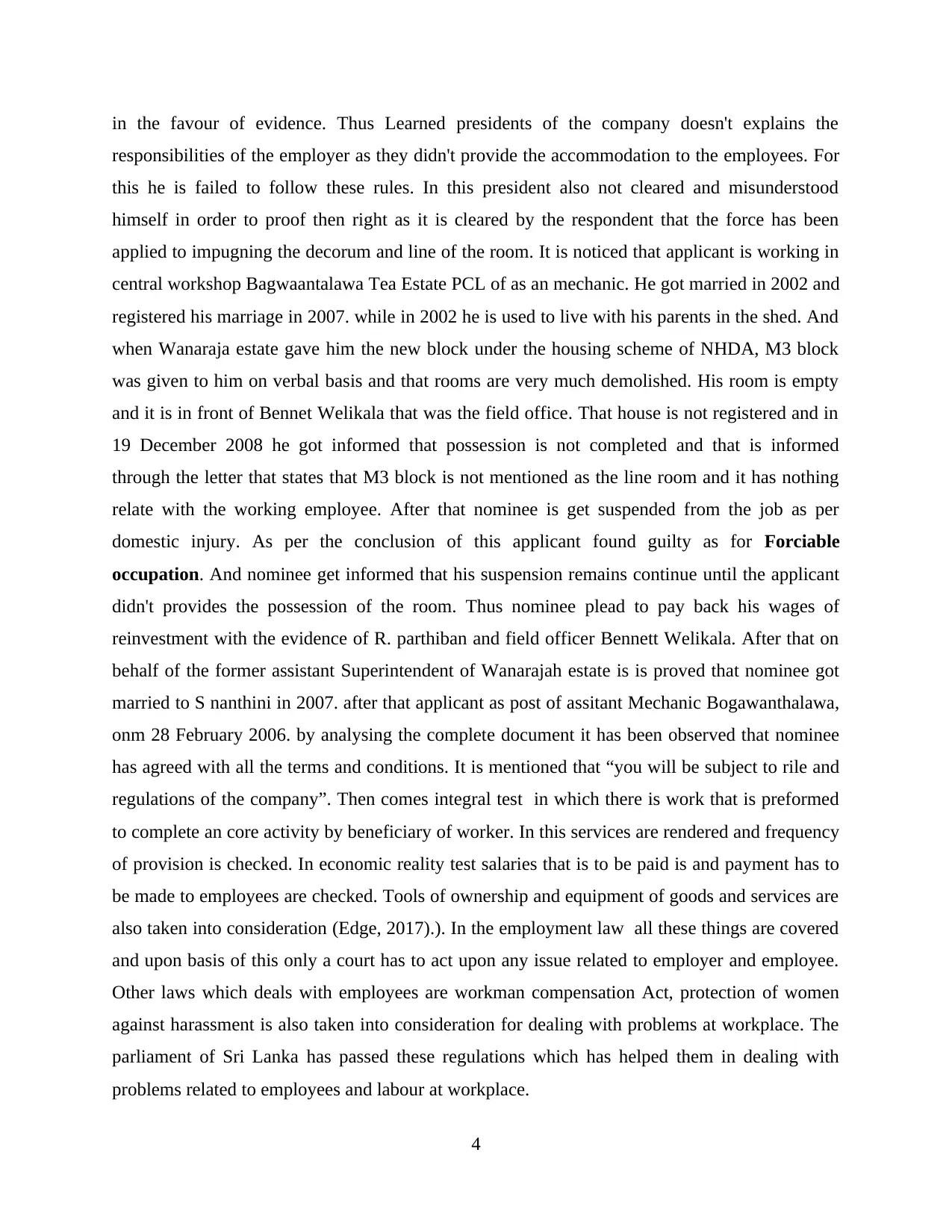
in the favour of evidence. Thus Learned presidents of the company doesn't explains the
responsibilities of the employer as they didn't provide the accommodation to the employees. For
this he is failed to follow these rules. In this president also not cleared and misunderstood
himself in order to proof then right as it is cleared by the respondent that the force has been
applied to impugning the decorum and line of the room. It is noticed that applicant is working in
central workshop Bagwaantalawa Tea Estate PCL of as an mechanic. He got married in 2002 and
registered his marriage in 2007. while in 2002 he is used to live with his parents in the shed. And
when Wanaraja estate gave him the new block under the housing scheme of NHDA, M3 block
was given to him on verbal basis and that rooms are very much demolished. His room is empty
and it is in front of Bennet Welikala that was the field office. That house is not registered and in
19 December 2008 he got informed that possession is not completed and that is informed
through the letter that states that M3 block is not mentioned as the line room and it has nothing
relate with the working employee. After that nominee is get suspended from the job as per
domestic injury. As per the conclusion of this applicant found guilty as for Forciable
occupation. And nominee get informed that his suspension remains continue until the applicant
didn't provides the possession of the room. Thus nominee plead to pay back his wages of
reinvestment with the evidence of R. parthiban and field officer Bennett Welikala. After that on
behalf of the former assistant Superintendent of Wanarajah estate is is proved that nominee got
married to S nanthini in 2007. after that applicant as post of assitant Mechanic Bogawanthalawa,
onm 28 February 2006. by analysing the complete document it has been observed that nominee
has agreed with all the terms and conditions. It is mentioned that “you will be subject to rile and
regulations of the company”. Then comes integral test in which there is work that is preformed
to complete an core activity by beneficiary of worker. In this services are rendered and frequency
of provision is checked. In economic reality test salaries that is to be paid is and payment has to
be made to employees are checked. Tools of ownership and equipment of goods and services are
also taken into consideration (Edge, 2017).). In the employment law all these things are covered
and upon basis of this only a court has to act upon any issue related to employer and employee.
Other laws which deals with employees are workman compensation Act, protection of women
against harassment is also taken into consideration for dealing with problems at workplace. The
parliament of Sri Lanka has passed these regulations which has helped them in dealing with
problems related to employees and labour at workplace.
4
responsibilities of the employer as they didn't provide the accommodation to the employees. For
this he is failed to follow these rules. In this president also not cleared and misunderstood
himself in order to proof then right as it is cleared by the respondent that the force has been
applied to impugning the decorum and line of the room. It is noticed that applicant is working in
central workshop Bagwaantalawa Tea Estate PCL of as an mechanic. He got married in 2002 and
registered his marriage in 2007. while in 2002 he is used to live with his parents in the shed. And
when Wanaraja estate gave him the new block under the housing scheme of NHDA, M3 block
was given to him on verbal basis and that rooms are very much demolished. His room is empty
and it is in front of Bennet Welikala that was the field office. That house is not registered and in
19 December 2008 he got informed that possession is not completed and that is informed
through the letter that states that M3 block is not mentioned as the line room and it has nothing
relate with the working employee. After that nominee is get suspended from the job as per
domestic injury. As per the conclusion of this applicant found guilty as for Forciable
occupation. And nominee get informed that his suspension remains continue until the applicant
didn't provides the possession of the room. Thus nominee plead to pay back his wages of
reinvestment with the evidence of R. parthiban and field officer Bennett Welikala. After that on
behalf of the former assistant Superintendent of Wanarajah estate is is proved that nominee got
married to S nanthini in 2007. after that applicant as post of assitant Mechanic Bogawanthalawa,
onm 28 February 2006. by analysing the complete document it has been observed that nominee
has agreed with all the terms and conditions. It is mentioned that “you will be subject to rile and
regulations of the company”. Then comes integral test in which there is work that is preformed
to complete an core activity by beneficiary of worker. In this services are rendered and frequency
of provision is checked. In economic reality test salaries that is to be paid is and payment has to
be made to employees are checked. Tools of ownership and equipment of goods and services are
also taken into consideration (Edge, 2017).). In the employment law all these things are covered
and upon basis of this only a court has to act upon any issue related to employer and employee.
Other laws which deals with employees are workman compensation Act, protection of women
against harassment is also taken into consideration for dealing with problems at workplace. The
parliament of Sri Lanka has passed these regulations which has helped them in dealing with
problems related to employees and labour at workplace.
4
⊘ This is a preview!⊘
Do you want full access?
Subscribe today to unlock all pages.

Trusted by 1+ million students worldwide
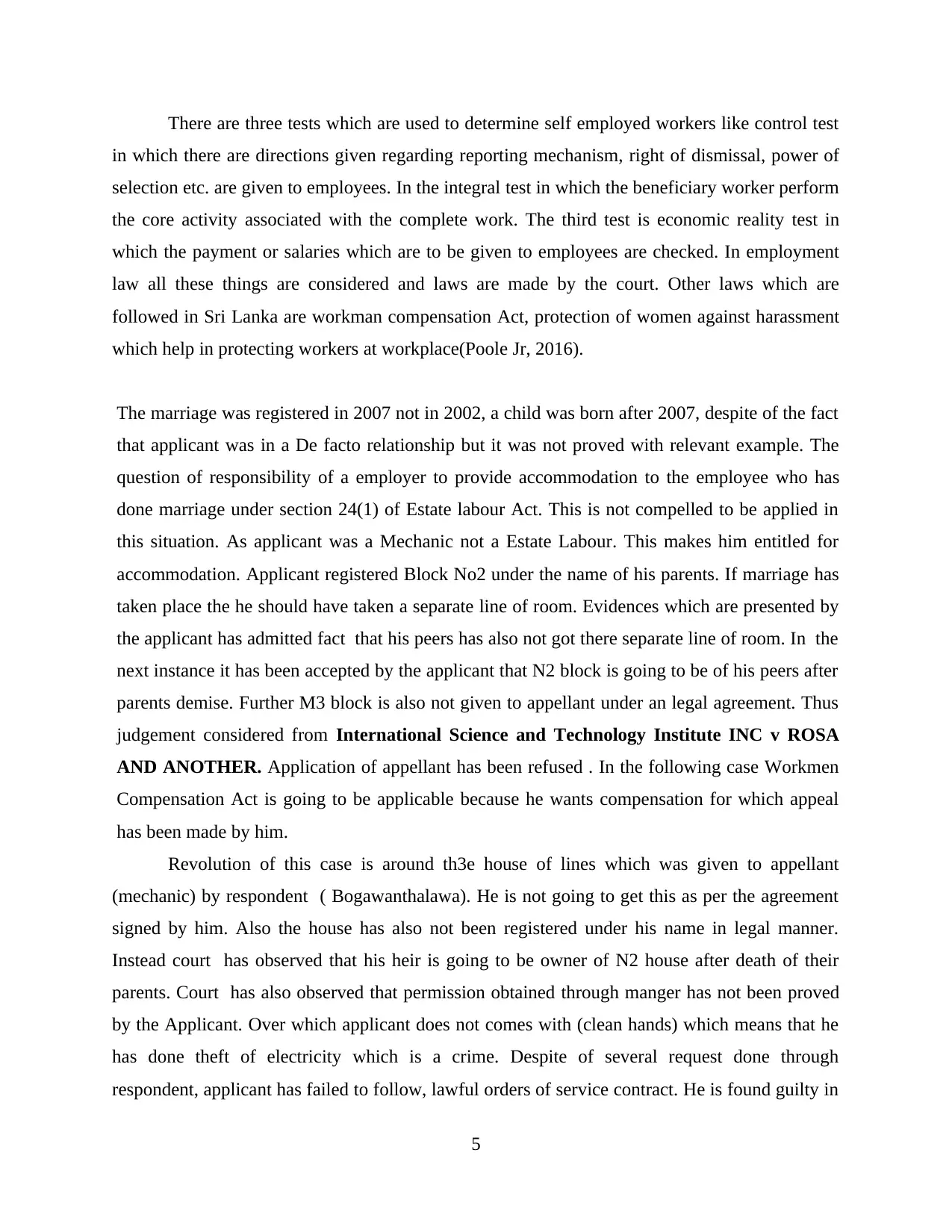
There are three tests which are used to determine self employed workers like control test
in which there are directions given regarding reporting mechanism, right of dismissal, power of
selection etc. are given to employees. In the integral test in which the beneficiary worker perform
the core activity associated with the complete work. The third test is economic reality test in
which the payment or salaries which are to be given to employees are checked. In employment
law all these things are considered and laws are made by the court. Other laws which are
followed in Sri Lanka are workman compensation Act, protection of women against harassment
which help in protecting workers at workplace(Poole Jr, 2016).
The marriage was registered in 2007 not in 2002, a child was born after 2007, despite of the fact
that applicant was in a De facto relationship but it was not proved with relevant example. The
question of responsibility of a employer to provide accommodation to the employee who has
done marriage under section 24(1) of Estate labour Act. This is not compelled to be applied in
this situation. As applicant was a Mechanic not a Estate Labour. This makes him entitled for
accommodation. Applicant registered Block No2 under the name of his parents. If marriage has
taken place the he should have taken a separate line of room. Evidences which are presented by
the applicant has admitted fact that his peers has also not got there separate line of room. In the
next instance it has been accepted by the applicant that N2 block is going to be of his peers after
parents demise. Further M3 block is also not given to appellant under an legal agreement. Thus
judgement considered from International Science and Technology Institute INC v ROSA
AND ANOTHER. Application of appellant has been refused . In the following case Workmen
Compensation Act is going to be applicable because he wants compensation for which appeal
has been made by him.
Revolution of this case is around th3e house of lines which was given to appellant
(mechanic) by respondent ( Bogawanthalawa). He is not going to get this as per the agreement
signed by him. Also the house has also not been registered under his name in legal manner.
Instead court has observed that his heir is going to be owner of N2 house after death of their
parents. Court has also observed that permission obtained through manger has not been proved
by the Applicant. Over which applicant does not comes with (clean hands) which means that he
has done theft of electricity which is a crime. Despite of several request done through
respondent, applicant has failed to follow, lawful orders of service contract. He is found guilty in
5
in which there are directions given regarding reporting mechanism, right of dismissal, power of
selection etc. are given to employees. In the integral test in which the beneficiary worker perform
the core activity associated with the complete work. The third test is economic reality test in
which the payment or salaries which are to be given to employees are checked. In employment
law all these things are considered and laws are made by the court. Other laws which are
followed in Sri Lanka are workman compensation Act, protection of women against harassment
which help in protecting workers at workplace(Poole Jr, 2016).
The marriage was registered in 2007 not in 2002, a child was born after 2007, despite of the fact
that applicant was in a De facto relationship but it was not proved with relevant example. The
question of responsibility of a employer to provide accommodation to the employee who has
done marriage under section 24(1) of Estate labour Act. This is not compelled to be applied in
this situation. As applicant was a Mechanic not a Estate Labour. This makes him entitled for
accommodation. Applicant registered Block No2 under the name of his parents. If marriage has
taken place the he should have taken a separate line of room. Evidences which are presented by
the applicant has admitted fact that his peers has also not got there separate line of room. In the
next instance it has been accepted by the applicant that N2 block is going to be of his peers after
parents demise. Further M3 block is also not given to appellant under an legal agreement. Thus
judgement considered from International Science and Technology Institute INC v ROSA
AND ANOTHER. Application of appellant has been refused . In the following case Workmen
Compensation Act is going to be applicable because he wants compensation for which appeal
has been made by him.
Revolution of this case is around th3e house of lines which was given to appellant
(mechanic) by respondent ( Bogawanthalawa). He is not going to get this as per the agreement
signed by him. Also the house has also not been registered under his name in legal manner.
Instead court has observed that his heir is going to be owner of N2 house after death of their
parents. Court has also observed that permission obtained through manger has not been proved
by the Applicant. Over which applicant does not comes with (clean hands) which means that he
has done theft of electricity which is a crime. Despite of several request done through
respondent, applicant has failed to follow, lawful orders of service contract. He is found guilty in
5
Paraphrase This Document
Need a fresh take? Get an instant paraphrase of this document with our AI Paraphraser
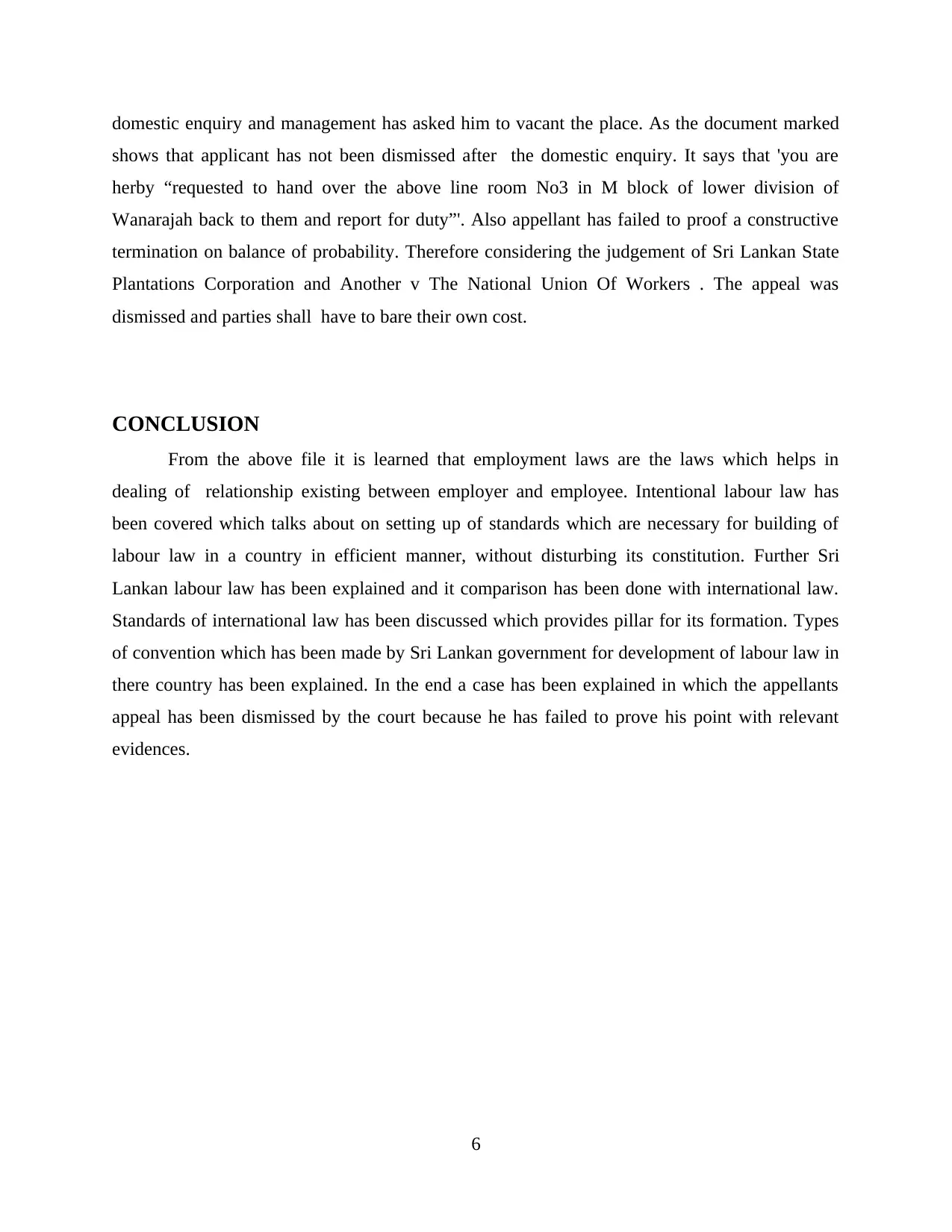
domestic enquiry and management has asked him to vacant the place. As the document marked
shows that applicant has not been dismissed after the domestic enquiry. It says that 'you are
herby “requested to hand over the above line room No3 in M block of lower division of
Wanarajah back to them and report for duty”'. Also appellant has failed to proof a constructive
termination on balance of probability. Therefore considering the judgement of Sri Lankan State
Plantations Corporation and Another v The National Union Of Workers . The appeal was
dismissed and parties shall have to bare their own cost.
CONCLUSION
From the above file it is learned that employment laws are the laws which helps in
dealing of relationship existing between employer and employee. Intentional labour law has
been covered which talks about on setting up of standards which are necessary for building of
labour law in a country in efficient manner, without disturbing its constitution. Further Sri
Lankan labour law has been explained and it comparison has been done with international law.
Standards of international law has been discussed which provides pillar for its formation. Types
of convention which has been made by Sri Lankan government for development of labour law in
there country has been explained. In the end a case has been explained in which the appellants
appeal has been dismissed by the court because he has failed to prove his point with relevant
evidences.
6
shows that applicant has not been dismissed after the domestic enquiry. It says that 'you are
herby “requested to hand over the above line room No3 in M block of lower division of
Wanarajah back to them and report for duty”'. Also appellant has failed to proof a constructive
termination on balance of probability. Therefore considering the judgement of Sri Lankan State
Plantations Corporation and Another v The National Union Of Workers . The appeal was
dismissed and parties shall have to bare their own cost.
CONCLUSION
From the above file it is learned that employment laws are the laws which helps in
dealing of relationship existing between employer and employee. Intentional labour law has
been covered which talks about on setting up of standards which are necessary for building of
labour law in a country in efficient manner, without disturbing its constitution. Further Sri
Lankan labour law has been explained and it comparison has been done with international law.
Standards of international law has been discussed which provides pillar for its formation. Types
of convention which has been made by Sri Lankan government for development of labour law in
there country has been explained. In the end a case has been explained in which the appellants
appeal has been dismissed by the court because he has failed to prove his point with relevant
evidences.
6
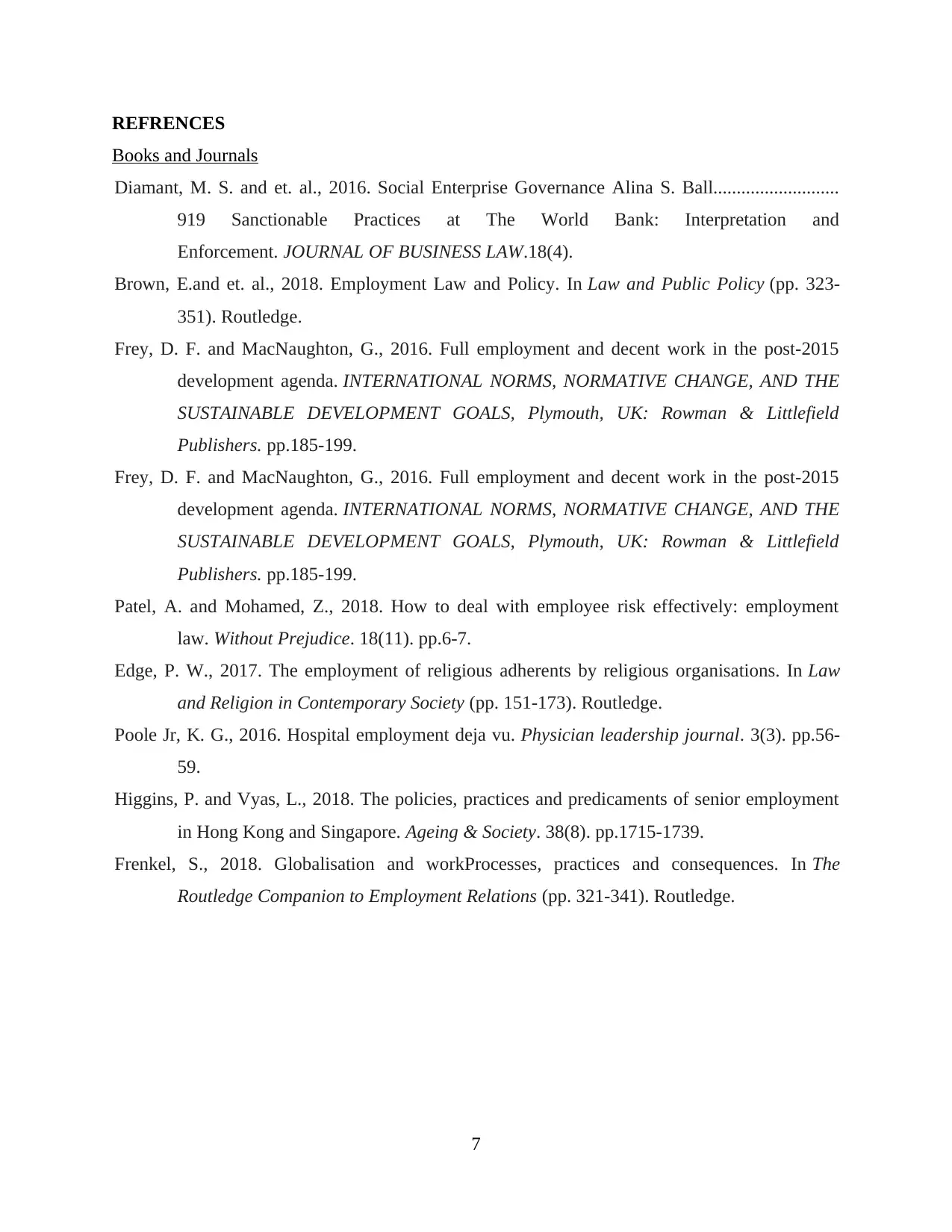
REFRENCES
Books and Journals
Diamant, M. S. and et. al., 2016. Social Enterprise Governance Alina S. Ball...........................
919 Sanctionable Practices at The World Bank: Interpretation and
Enforcement. JOURNAL OF BUSINESS LAW.18(4).
Brown, E.and et. al., 2018. Employment Law and Policy. In Law and Public Policy (pp. 323-
351). Routledge.
Frey, D. F. and MacNaughton, G., 2016. Full employment and decent work in the post-2015
development agenda. INTERNATIONAL NORMS, NORMATIVE CHANGE, AND THE
SUSTAINABLE DEVELOPMENT GOALS, Plymouth, UK: Rowman & Littlefield
Publishers. pp.185-199.
Frey, D. F. and MacNaughton, G., 2016. Full employment and decent work in the post-2015
development agenda. INTERNATIONAL NORMS, NORMATIVE CHANGE, AND THE
SUSTAINABLE DEVELOPMENT GOALS, Plymouth, UK: Rowman & Littlefield
Publishers. pp.185-199.
Patel, A. and Mohamed, Z., 2018. How to deal with employee risk effectively: employment
law. Without Prejudice. 18(11). pp.6-7.
Edge, P. W., 2017. The employment of religious adherents by religious organisations. In Law
and Religion in Contemporary Society (pp. 151-173). Routledge.
Poole Jr, K. G., 2016. Hospital employment deja vu. Physician leadership journal. 3(3). pp.56-
59.
Higgins, P. and Vyas, L., 2018. The policies, practices and predicaments of senior employment
in Hong Kong and Singapore. Ageing & Society. 38(8). pp.1715-1739.
Frenkel, S., 2018. Globalisation and workProcesses, practices and consequences. In The
Routledge Companion to Employment Relations (pp. 321-341). Routledge.
7
Books and Journals
Diamant, M. S. and et. al., 2016. Social Enterprise Governance Alina S. Ball...........................
919 Sanctionable Practices at The World Bank: Interpretation and
Enforcement. JOURNAL OF BUSINESS LAW.18(4).
Brown, E.and et. al., 2018. Employment Law and Policy. In Law and Public Policy (pp. 323-
351). Routledge.
Frey, D. F. and MacNaughton, G., 2016. Full employment and decent work in the post-2015
development agenda. INTERNATIONAL NORMS, NORMATIVE CHANGE, AND THE
SUSTAINABLE DEVELOPMENT GOALS, Plymouth, UK: Rowman & Littlefield
Publishers. pp.185-199.
Frey, D. F. and MacNaughton, G., 2016. Full employment and decent work in the post-2015
development agenda. INTERNATIONAL NORMS, NORMATIVE CHANGE, AND THE
SUSTAINABLE DEVELOPMENT GOALS, Plymouth, UK: Rowman & Littlefield
Publishers. pp.185-199.
Patel, A. and Mohamed, Z., 2018. How to deal with employee risk effectively: employment
law. Without Prejudice. 18(11). pp.6-7.
Edge, P. W., 2017. The employment of religious adherents by religious organisations. In Law
and Religion in Contemporary Society (pp. 151-173). Routledge.
Poole Jr, K. G., 2016. Hospital employment deja vu. Physician leadership journal. 3(3). pp.56-
59.
Higgins, P. and Vyas, L., 2018. The policies, practices and predicaments of senior employment
in Hong Kong and Singapore. Ageing & Society. 38(8). pp.1715-1739.
Frenkel, S., 2018. Globalisation and workProcesses, practices and consequences. In The
Routledge Companion to Employment Relations (pp. 321-341). Routledge.
7
⊘ This is a preview!⊘
Do you want full access?
Subscribe today to unlock all pages.

Trusted by 1+ million students worldwide
1 out of 9
Related Documents
Your All-in-One AI-Powered Toolkit for Academic Success.
+13062052269
info@desklib.com
Available 24*7 on WhatsApp / Email
![[object Object]](/_next/static/media/star-bottom.7253800d.svg)
Unlock your academic potential
Copyright © 2020–2025 A2Z Services. All Rights Reserved. Developed and managed by ZUCOL.





